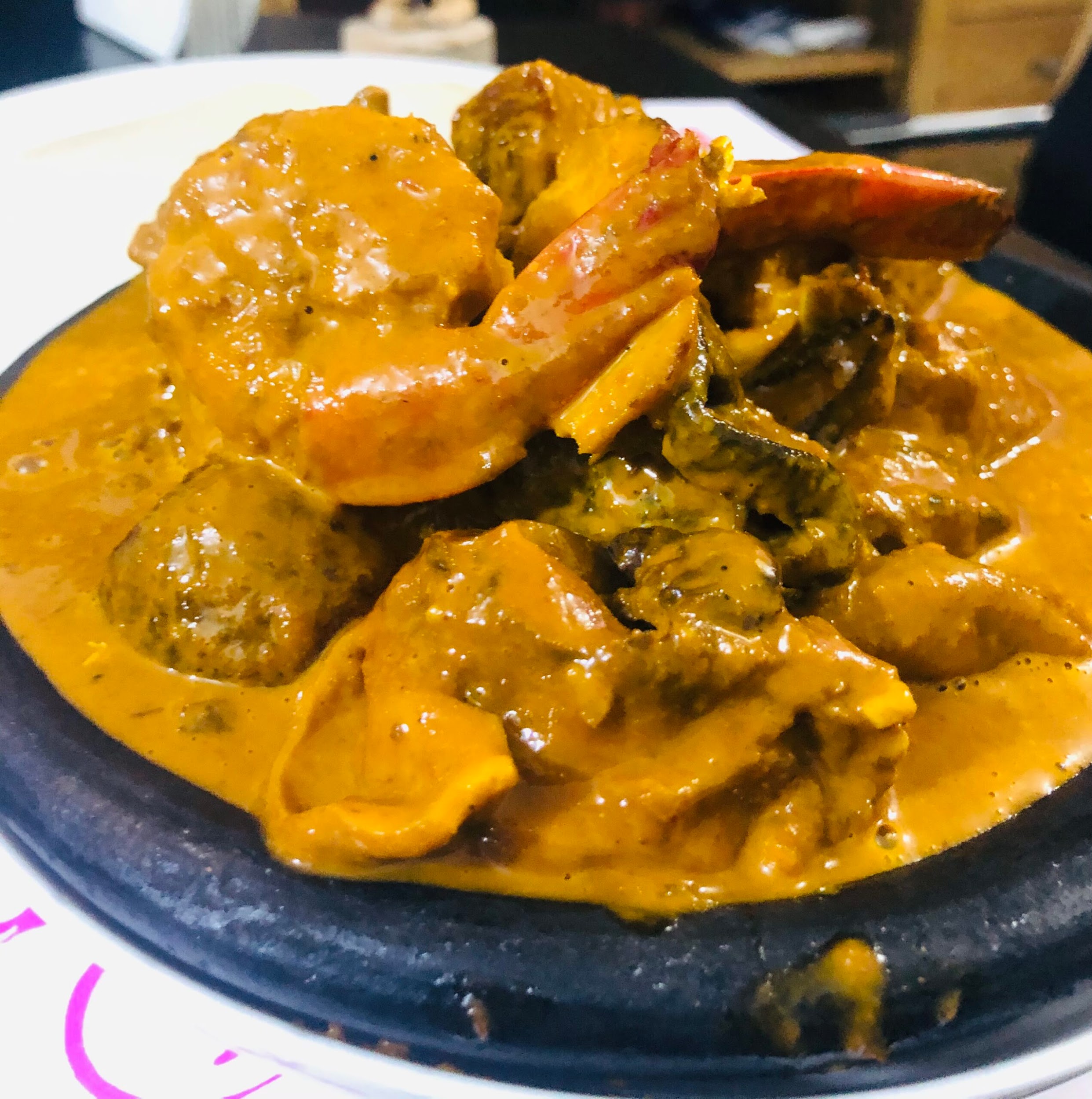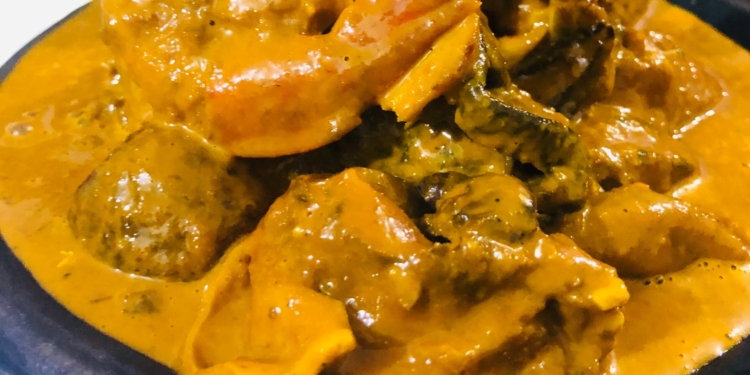Have you ever tasted the delicious and hearty Urhobo Owo soup from Nigeria? If not, you’re in for a treat. This soup, also known as owho soup, is a staple dish of the Urhobo people of Delta State in southern Nigeria.
The key is using the freshest ingredients and a perfect blend of spices to create a robust flavor. In this article, I’ll walk you through how to make authentic Owo soup from scratch.
What Is Owo Soup?

Owo soup is a popular Nigerian soup originating from Nigeria’s southeastern areas (Benin-Bini, Urhobo, Delta, Itsekhiri, Ijaw, Edo, and Isoko). With a yellowish color and thick consistency, owo soup has an intriguing flavor. The yellow color is obtained from a combination of native palm oil and potash, making it seem quite appealing. The English name for Owo soup is palm oil soup. Other common names for Owo soup include oghwo ofigbo and Oghwo Evwri.
Owo soup is high in nutrients like protein, fat, potassium, and iron. Owo soup is usually eaten with a side of Starch, pounded yam, fufu, boiled plantain, or boiled yam; it is sometimes eaten alone. This traditional dish is a source of pride, bringing family and friends together to enjoy a flavorful and nourishing meal.
History of Owo Soup
Owho soup is a popular dish in Nigeria’s south-central area. It is common among ethnic groups such as Urhobo, Benin-bini, Itsekiri, Ijaw, and Edo. The origin of the Owo soup dish is unknown because there has always been conflict between the Urhobo people of Delta State and the Bini people of Edo State. However, the preparation of Benin Owo soup differs slightly from that of Urhobo/Itsekiri Owo soup.
According to old tales, the soup originated with the Urhobo or Bini people. Owho soup is popular in Delta and Edo states, where the two tribes coexist. It is especially revered by the Urhobo people. The soup gets its name from the city of Owo. Today, there are many varieties of the soup, but the original version, containing potash, pepper, and palm oil, is still common.
How to Prepare Nigerian Owo Soup/Owho Soup
To make Urhobo Owo soup, you’ll need the following essential ingredients:
Owo Soup Recipe
- Assorted meat and fish of choice, e.g., Beef, Ponmo, Snails, Dry Fish, and Stock Fish.
- Palm oil (Preferably Native Oil, also known as Banga Oil)
- Powdered edible potash (akanwu, Kaun)
- Ground Crayfish
- 1 cup of garri
- Hot and spicy pepper
- 2 stock cubes
- Salt
By combining the ingredients above, you’ll have a hearty and full-flavored Owo soup rich in history and culture. The unique blend of spices and assorted proteins makes this dish stand out.
Instructions
To prepare the delicious Owo soup, follow these simple steps:
- Soak your dry fish to soften.
- Mix the potash with a little amount of water, then set aside.
- Once the fish is softened, clean, debone, and separate the dry fish into pieces.
- Pour the palm oil into a small container, and gently pour the potash water into the palm oil while stirring at the same time till the palm oil turns yellow and becomes thick.
- Cook the meat and stockfish with the seasoning cubes and salt till it becomes soft.
- Blend the garri, then mix it with some meat and fish stock to get a soft dough.
- Add the dry fish, crayfish, and pepper to the pot, then cover for about 7 minutes.
- Add the palm oil mix and scoop small lumps of the garri dough into the pot. Do not cover the pot from the point onwards because it will boil over due to the potash in the palm oil.
- When the lumps of garri have dissolved, and the soup is no longer foaming. Then your soup is ready, but If you get the consistency you like for your soups before the garri lumps completely dissolve, remove the excess lumps.
- Stir very well and take it off the heat.
Your Urhobo Owo soup is ready to be served with pounded yam, eba, semovita, or boiled plantain. Serve it hot and savor the delicious blend of flavors. A cold drink, or palm wine, is perfect for washing it all down and balancing the heat from the soup. Enjoy your owo soup; no utensils are needed! Dig in with your hands, roll up your sleeves, and savor all the flavors.
How to Make Owo Soup Benin-style
- Wash your meat and place it in a pot; add your chopped onion, salt, and seasoning cube, then cook until it is tender.
- Pour in the tomatoes, pepper, and crayfish, and allow to boil for about 10 minutes.
- Add your smoked fish and prawns into the pot, then cook for another 5-10 minutes. Stir consistently to prevent it from burning.
- Dissolve the potash powder in hot water. Gently strain a small amount of the liquid inside the pot. Allow to cook for a few minutes.
- Add palm oil and stir for about 5 minutes. Your Benin Owo Soup is ready!
Serve with your choice of swallow, yam, or plantain.
Frequently Asked Questions about Owo Soup
Here are some frequently asked questions about Owo Soup.
How long does it take to prepare?
Owho Soup can take about 40 minutes to 1 hour to prepare properly. The meat and fish need to cook for a long time to become very soft and flavorful. Other ingredients only need 5-30 minutes.
Can I freeze any leftovers?
Yes, Owho Soup freezes very well for up to 3 months. Let the soup cool, then freeze portions in air-tight containers or ziplock bags. When ready to eat, simply reheat the soup over medium heat, stirring frequently, until it’s hot all the way through. You may need to add a bit of water or stock when reheating.
What is the traditional way to eat Owo Soup?
Owho Soup is usually eaten with a side of starchy foods like pounded yam, eba (garri), fufu, or boiled plantain. It is best eaten with hands; ensure your hands are well-cleaned before eating.
Which Nigerian tribe has the best type of Owo soup?
Benin Owo soup, Ofe Owerri, is the richest and most well-known soup from the Igbos of southeast Nigeria.
Conclusion
Now that you have all the ingredients prepped and the broth simmering, you’re ready to serve up a hearty bowl of Owo soup.
This classic Nigerian dish is meant for sharing with friends and family. There’s nothing quite like gathering around a table, talking, laughing, and enjoying a delicious homemade meal together. Owo soup is a perfect choice for such an occasion.


Discussion about this post